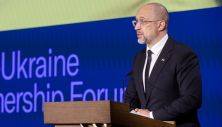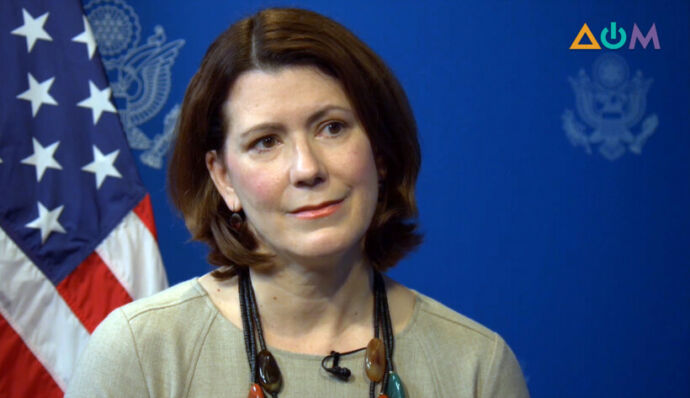Andrea Kalan is an official representative of the US State Department. The main direction of her work is to convey US policy to the Russian-speaking audience, as well as to tell about life in the country in general – “so that people who speak Russian understand America better” – said the special envoy.
In an interview, Andrea Kalan explained the role of the State Department’s special envoy for Russian-speaking audiences, spoke about methods of combating disinformation from Russia, spoke about official Washington’s relations with Russian federal media, commented on talks with Russia in Geneva and Brussels and answered a number of other questions.
Journalist Vitaliy Sizov spoke with Andrea Kalan in Brussels.
– In the US State Department you are a representative of the work with the Russian-speaking audience. How unique is this situation and why is it done?
– Well, it’s always better when people understand each other. And how to do it? It is better to do it in your native language. So we have an official representative of the State Department, Ned Price, in Washington, D.C. – he speaks in English about US foreign policy. And we have officials here in Brussels and around the world who speak other languages to explain US foreign policy and talk more about culture and life in America.
I am currently in Brussels and talking to the Russian-language media to explain US foreign policy, to answer their questions, and to make Russian-speaking people better understand America, better understand our values, better understand our politics. Unfortunately, there is a lot of misinformation in the world right now, and my goal is to explain in Russian why America is making some decisions, and just to explain more about our country.
– You talked about misinformation. But often the source of misinformation is the Russian Federation. Do you feel that your direction of work with the Russian-speaking audience is more relevant today than other language directions?
– Misinformation from Russia is very strong. Some call it the information struggle. So, of course, I feel that my work is very important. It is extremely important that we can provide real information.
For example, I read Russian-language media and Russian media every day and see: aha, this is not the way it is presented, I need to explain our position in more detail. That’s why I give interviews in Russian. We use various platforms to combat misinformation, for example, we have the “US in Russian” on Twitter, Facebook, Instagram.
For example. Meetings [with Russia] in NATO took place this week. And if you read about it today in the Russian media, then there is a completely different idea of what was happening than we present, who really were at this meeting.
Therefore, it is very important that different countries are explained so that people can make their own decisions.
– Do you single out any main areas of disinformation from the Russian Federation?
– Misinformation happens everywhere, in different directions. For example, we have recently seen such false information from Russia. That, say, the United States has agreed or will agree with Russia that Ukraine, Georgia or other countries will not be able to become members of NATO. This is direct misinformation. And our goal is to show everyone – no, the door is open, any country that wants to join NATO can become a member of NATO, and that the United States does not decide, it is NATO, that is, all 30 countries that make this decision together. Especially recently, we have seen misinformation from the Russian side in this area.
– The US talks with Russia took place in Geneva on January 10. There was a huge pool of Russian media. And they create a certain picture, form the opinion of the Russian mass audience. How can I reach this audience? And which of the Russian media do you see as your partners, so to speak? Because the federal media is unlikely to reflect your point, I think.
– Yes, the federal media very rarely shows us. However, for example, US ambassadors to Russia sometimes give interviews to the Russian media. But they don’t interview me often.
It is difficult for me to explain our positions to the audience through the state media. But it is very good that there is the Internet, there are social networks where people can see different sources, views.
And it is through social networks that we try to explain our position.
– Who do you see as your key audience? Is it Russia after all, or is it a Russian-speaking community around the world?
– I want to talk to everyone who speaks Russian. Not only with the audience in the Russian Federation. There are a lot of visitors to our platforms in Central Asia, we communicate with them through Instagram, for example. We have a lot of spectators in the Baltic States. And, of course, in America, there are many Russian-speaking people. They immigrated or are studying in the United States. And so around the world.
– What is the response of people to your information? Suppose he changed his mind. How much is your audience growing?
– There are different things. We see the growth of the audience. For example, every week more and more people visit our platforms, read our tweets, watch our videos on Facebook and Instagram.
People write to us [in the comments]: oh, thank you, we are glad that you support us, or – we are glad that you raised this issue. Of course, and vice versa, there are many trolls who also write interesting comments on our platforms.
By the way, my videos were shown on Russian channels as well, for example, clips were shown in the “60 minutes” program.
– With a certain interpretation, perhaps?
– With a certain interpretation. Of course, I do not agree with their comments on the video, but the most important thing is that people saw our videos and could hear our comments, our thoughts.
It is quite difficult, but my task is to get more people to know about our position. They make their own decisions. It is our job to give them access to information.
– You said that people should make their own decisions based on different positions. Perhaps the strategic approach is correct. But don’t you think that tactically you can lose to the Russian Federation? Not only in Russia, but also in those regions of the world where it dominates information, often violating information standards?
– We speak openly and we want people to make decisions. This is a testament to American values. There is freedom of speech in America, people can say whatever they want, they can watch different TV channels, they make their own decisions.
And here it is the same. We just want to provide real information, correct information. When we see someone lying, of course, I say no. For example, every week we hear from the Russian Ministry of Foreign Affairs, in my opinion, incorrect statements about NATO.
– Do you mean that there were commitments not to expand NATO, and a number of statements that Ukraine threatens Russia?
– So. If a person hears from the Ministry of Foreign Affairs that Ukraine is threatening Russia, and then they really see that Russia has annexed Crimea, Russia has put tens of thousands of troops and equipment on the border with Ukraine… If they see that there is a huge disinformation against Ukraine… What Ukraine not the aggressor in this situation, what exactly is Russia threatening… Here is our task just to show this information so that people can compare: yeah, what I hear from the Russian side, in this case completely wrong, not at all. This is the essence of my work.
– But the Russian federal media also say that they give a different view. Why is this not a “different view”, why is it still largely misinformation?
– This is not a difference of opinion.
There is just an opinion, but there is a fact. And it’s important that viewers understand this difference. And we need to talk more with the audience, how to distinguish opinion from fact.
And that’s what we do. We point out that this is not a fact. On our platforms there is, for example, a series – myth and fact. And we show a myth that we see in the Russian media or in the Russian Ministry of Foreign Affairs – for example, the myth of how NATO surrounds Russia, how NATO threatens tanks – and we show the fact. Viewers see it and think: aha, we need to look more critically at what we hear.
– Do you work with bloggers? Because now it seems that the alternative in Russia has gone completely on YouTube. And bloggers often become leaders of public opinion.
– As a Russian-speaking representative of the State Department, I agree to comment on bloggers. I know my comments are very common on YouTube. Especially now in Russia, when there is a decline or no independent media.
That’s why people are forced to make their own programs on YouTube. And even TV channels. For example, the Dozhd TV channel has not been able to air in Russia for a long time. And broadcasting is via the Internet.
I think that in the future people all over the world will be more focused on receiving news via the Internet, YouTube. My kids are already watching YouTube more than watching TV.
– Ukraine is also in the focus of your attention, because our audience needs to be informed about the facts of the fight against misinformation.
– Ukraine has a huge potential to combat misinformation. This can be done through the Russian-language media, through the Ukrainian-language media. But many in Ukraine speak Russian, and it is very good that through your channels we can explain the real facts to them and fight against misinformation. This needs to be done at different levels, on different platforms. Misinformation is, unfortunately, cancer.
– In addition. It also hits the misinformer. If you look at Russian federal TV channels, there is an official agenda – they are all confident vaccinators, they promote vaccination. But if we go to channels connected with the Russian Federation abroad – they show anti-vaccination rallies, they seem to support discussions, the topic is that it is not necessary, that quarantine measures in Western Europe are a restriction of human rights. And as a result, we see that Russia is not doing very well with the coronavirus and people do not really want to be vaccinated. It turns out that the propaganda they send abroad is returning to their country.
– When the pandemic began, I lived in Moscow. And I saw how the campaign developed. At first it was said that COVID-19 does not exist at all, no one dies from it. And such misinformation went abroad.
Russia is now undergoing a very strong campaign to get people vaccinated, and at the same time, disinformation is really going on abroad.
People see this dissonance. And in this example, we have the opportunity to explain to people why you need to look very critically at the situation. Because misinformation uses extremely bright, emotional shots. And people have to think, yeah, now, I need to check what I see. This is again the media literacy of the audience.
– Returning to the US-Russia meeting, the Russia-NATO Council meeting. It is difficult for the average reader and viewer to understand the outcome of these meetings. Therefore, it seems that the situation has not changed significantly. Everyone remained in their positions. Could you explain in simple words what the progress was, at least minimal? If, of course, he was.
– The progress was that diplomacy continues. There was a meeting in Geneva, then in Brussels and today in Vienna. Both NATO allies and partners in the OSCE were able to explain their position, their concerns. And the Russian side as well. And when we have such a dialogue, then we can move on.
I have heard that some are dissatisfied with the fact that there is no concrete result, no concrete action. We need space for diplomacy. We need to talk to each other, explain our positions, and then work with it and find a solution. And this is the essence of diplomacy.














